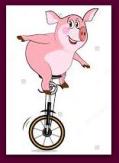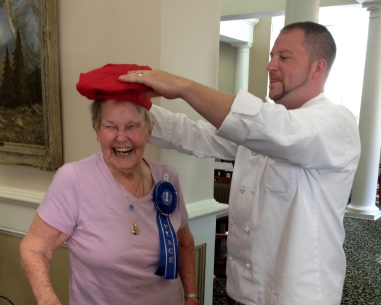Brewing Up LIFE!
The photo shown here represents an amazing transformation for one resident of Unit ing Caroona Yamba, and his story brought joy and tears to a group of staff there.
ing Caroona Yamba, and his story brought joy and tears to a group of staff there.
Why?
This gentleman was deemed as having a rapid decline in cognition, being lost and not doing well in the open Household. Pressure was being applied to relocate him to a smaller more secure Household, as he was not enjoying the one he was in. He was never doing anything purposeful, only moving from sleeping in a lounge chair to table and back to sleeping in a chair. He hadn’t initiated any outdoor activities for months. His conversation was disappearing and he was withdrawn – never joining in activities. Sad, lonely and lost are the words that come to mind.
And then the miracle-working staff went to work. After only a couple of weeks of focus on him, persuasive staff were having success involving him in the village garden, picking the new beans, watering plants and then, “Let’s get the beer-brewing up and running.” He slowly joined in more and more until he decides where he wants to be and what he wants to do. And there’s no fooling him now. “Hey this is yesterday’s paper. What about today’s?” Picture this: a quiet man watching the first fermenting bubbles in a beer brew kit he helped set up yesterday. Tonight was a first! He went on his own to make sure the beer was bubbling as it should. He was observed by staff who were overjoyed at this new interest in life after many months of solitude and inactivity. A real transformation!
This man had been declining rapidly, but now has interest and enjoyment in his life. Two staff in particular fought to keep working with him, as they believed they could retrieve him from his decline. They literally prevented his relocation to what we now know would have been an inappropriate household.
Both of the staff members involved in the resident’s renewed interest in life have recently won awards for their work. They are wonderful examples of inspired care giving that is infectious among the staff.
This story was shared with us by Debra Smith of Uniting Caroona Yamba, a community within Uniting in Australia
Just a Few Knick-Knacks…
The following Community Circle occurred during recent dinners with the residents…
Several residents laughed when Joyce Jackson called the figurines around the dining area ‘knick-knacks’. The figurines were then brought to the tables and the residents examined them, asked questions, and expressed their like or dislike of them.
 There was a pig riding a unicycle, a rooster also riding a unicycle and a ceramic horse with a clown riding on his back. The horse had dogs on each side.
There was a pig riding a unicycle, a rooster also riding a unicycle and a ceramic horse with a clown riding on his back. The horse had dogs on each side.
Mrs. A. said, “When a horse’s ears are pinned to his head, he’s agitated. You better not mess with him.” Mrs. W. then asked Mrs. A. if she likes horses. A new conversation was started.
Mrs. A. talked about her brother loving horses and she pretended to like them. She admitted she learned a lot, the hard way.
Mr. K. declared, “I wouldn’t want them in my house.”
There were also two dolls, Amish, with no facial features. Mr. K. said, “Where is the face? They don’t look right without eyes.”
There was laughter and smiling faces during the conversations.
We continued the activity the following week during dinner. Residents were asked about the earlier discussion on the figurines. Mrs. A. stated, “If I had a clown riding on my back, I’d be agitated, too!” And then she told this story. “One time my brother was walking a horse with me on its back. My brother got distracted and let the reins go. The horse started running and my foot got stuck in the stirrup and dragged me. I was only 8 years old. I think that’s when my back troubles first started.”
Mrs. K. shared another horse story. “A horse bit my shoulder when I was young. My father had horses and once a horse was being stitched up after jumping a barbed wired fence and he bit me. The vet poured a quart bottle of Methylate on my body. “ (Ed.: Yeow!)
Everyone enjoyed the sharing of the objects and the good conversations around the dinner table.
This story was shared with us by Joyce Jackson of Windsor Meade, a community within Virginia United Methodist Homes
Diet Liberalization Program Makes a Positive Difference for Residents
Sentara Chesapeake Nursing Center has embraced New Dining Practice Standards by initiating a diet liberalization program for its residents as part of their culture change journey. Research has shown that providing more options in long term care settings provides positive resident outcomes. It can also lead to a better quality of life by allowing residents to choose the foods they enjoy eating. Lastly, this initiative can lead to improved nutritional status and a reduced prevalence of weight loss that ultimately is a better experience for our patients.
How does it work?

Once a resident who was receiving a modified diet is identified as a candidate, a Bedside Swallow Evaluation is performed by a Speech Therapist to ensure that a diet upgrade is clinically safe for the resident. Over the last three months since Chesapeake began diet liberalization in the facility, therapeutic diets have decreased to less than 27% of residents as compared to an average of 51% in other Life Care sites. Conversely, the number of residents receiving regular texture diets have increased from 49% to 77%.
The new diet option has been well received by Chesapeake residents and their families. The new dining practice standards have also allowed the opportunity for Sentara Life Care to move away from other more typical institutional nursing homes practices that limit resident choice. Liberalized dining enables a culture that fosters resident’s right of choice, by allowing residents to eat what they want. This program is only the beginning of Life Care’s culture change journey as these initiatives will be rolled out to other Life Care sites very soon.
Story shared with us by Sentara Rehabilitation and Care Residence – Chesapeake, VA. From their November newsletter.



 “resident recipe of the month” a step further and turned it into a resident cook-off. Residents submitted their favorite dessert recipes at the beginning of the month. Then they voted for their top seven favorite desserts for the cook-off. This week the cooks were busy preparing the top seven desserts, strictly following the recipes submitted. The residents were very excited to finally get to taste all seven desserts and crown our resident cook-off winner!
“resident recipe of the month” a step further and turned it into a resident cook-off. Residents submitted their favorite dessert recipes at the beginning of the month. Then they voted for their top seven favorite desserts for the cook-off. This week the cooks were busy preparing the top seven desserts, strictly following the recipes submitted. The residents were very excited to finally get to taste all seven desserts and crown our resident cook-off winner! 



